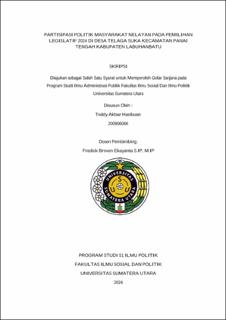Partisipasi Politik Masyarakat Nelayan Pada Pemilihan Legislatif 2024 Di Desa Telaga Suka Kecamatan Panai Tengah Kabupaten Labuhanbatu
Political Participation of Fishermen's Community in the 2024 Legislative Election in Telaga Suka Village Panai Tengah District Labuhanbatu Regency

Date
2024Author
Hasibuan, Teddy Akbar
Advisor(s)
Ekayanta, Fredick Broven
Metadata
Show full item recordAbstract
This study focuses on the political participation of the fishermen community in the 2024 legislative election in Telaga Suka Village Panai Tengah Sub-District Labuhan Batu Regency. This research is motivated by the political participation of fishermen communities, who have long been overlooked as a societal group capable of influencing decision-making processes. The theoretical
framework applied in this study is the theory of political participation proposed by Samuel Huntington and P. Nelson, which aligns with the research objectives. The research method employed in this study is a descriptive qualitative approach. The findings reveal that the political participation of the fishermen community in Telaga Suka Village takes various forms. These include lobbying, contacting political representatives, participating in fishermen organizations, conducting campaigns, and serving as members of campaign teams. The political participation of the fishermen community is motivated by rational considerations and occurs voluntarily without coercion from political elites, driven by the
presence of legislative candidates originating from the fishermen community itself. Based on these forms of participation, the intensity of political participation
among the fishermen community in Telaga Suka Village can be categorized into observers, participants, and activists. Legislative candidates from the fishermen community are classified as activists, while leaders of fishermen groups and their members are categorized as participants. The remaining members of the community are classified as observers, as they only follow campaigns and
organizational activities passively, observing and accepting decisions. However, this study identifies several obstacles to political participation, including limited access to political education and information, which the fishermen community has
not adequately received from elected legislative candidates. The presence of legislative candidates from the fishermen community is expected to improve the living standards of the fishermen, who have historically been regarded merely as a vote bank during elections by political leaders.
Collections
- Undergraduate Theses [1110]
